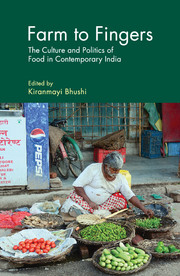Book contents
- Frontmatter
- Dedication
- Contents
- List of Figures and Tables
- Preface
- 1 Introduction
- 2 The Making of ‘Edible Animal Source Foods’ and its Contemporary Reality in Delhi
- 3 Appropriating the Cow: Beef and Identity Politics in Contemporary India
- 4 Eating Akhuni in India
- 5 Health, Standardization and ‘Bengali’ Sweets
- 6 Treating Children, Feeding Junk Food: An Inquiry into a Middle Class Project
- 7 Diaspora Dish: Cooking, Writing, and Creating Identities in Food-blogs
- 8 Measuring Hunger: Debates on an ‘Adequate’ Diet in Colonial North India
- 9 Managing Food: India's Experience with the Public Distribution System
- 10 Food Sovereignty: The Future of Food
- Contributors
- Index
1 - Introduction
Published online by Cambridge University Press: 05 July 2018
- Frontmatter
- Dedication
- Contents
- List of Figures and Tables
- Preface
- 1 Introduction
- 2 The Making of ‘Edible Animal Source Foods’ and its Contemporary Reality in Delhi
- 3 Appropriating the Cow: Beef and Identity Politics in Contemporary India
- 4 Eating Akhuni in India
- 5 Health, Standardization and ‘Bengali’ Sweets
- 6 Treating Children, Feeding Junk Food: An Inquiry into a Middle Class Project
- 7 Diaspora Dish: Cooking, Writing, and Creating Identities in Food-blogs
- 8 Measuring Hunger: Debates on an ‘Adequate’ Diet in Colonial North India
- 9 Managing Food: India's Experience with the Public Distribution System
- 10 Food Sovereignty: The Future of Food
- Contributors
- Index
Summary
Never has food been such a fodder for controversies and debates as it has been in the present conjuncture of India. The last few decades in India have seen a rise of cultural politics that have revolved around issues of identity where food, given its potent symbolic significations, has been deployed as a strategy of boundary differentiation and marker of distinction. Food is deeply implicated in notions of community be it caste, ethnicity, region or nation. The controversy surrounding cow slaughter and beef-eating or meat-eating, and the subsequent focus on vegetarianism, is one such signpost of our times. The adoption of liberalization, globalization and privatization programmes and policies has opened India to a great range of shifts. The global networks and flows, aided by communication technologies, have made the world more connected than before and made India a node in this connected world such that the global and the local nourish each other. Modern media technologies and mass migration have produced an increasing insatiability in culture and social arrangements. The flows and interconnections, and global processes and changes are destabilizing the thraldom of ‘habitus’ where culture and social structures are typically reproduced through embodied dispositions (Bourdieu 1977). In this new conjuncture, constructions of self, identity, and community, among other things, become slippery, implicated as they are by global flows. The ideas of national cuisine, what constitutes ethics of food, self projects of well being, agrarian choices are all subject to global forces and processes. Culinary and gustatory ‘imaginary’, to use Appadurai's (1996) term, have overtaken the public space in India of late. This can be gauged from the public cultures of eating and drinking – seen in the rise of restaurants, takeouts, and packaged food, cookbooks, cooking shows, dieticians, food and wellness related enterprises, new technologies of cooking, eating, and dining. Seen too are global flows of commodities, images, ideas, and discourses about food.
- Type
- Chapter
- Information
- Farm to FingersThe Culture and Politics of Food in Contemporary India, pp. 1 - 36Publisher: Cambridge University PressPrint publication year: 2017



